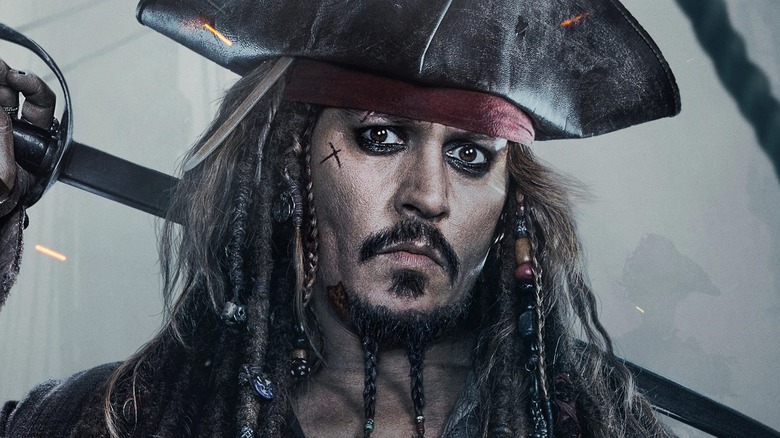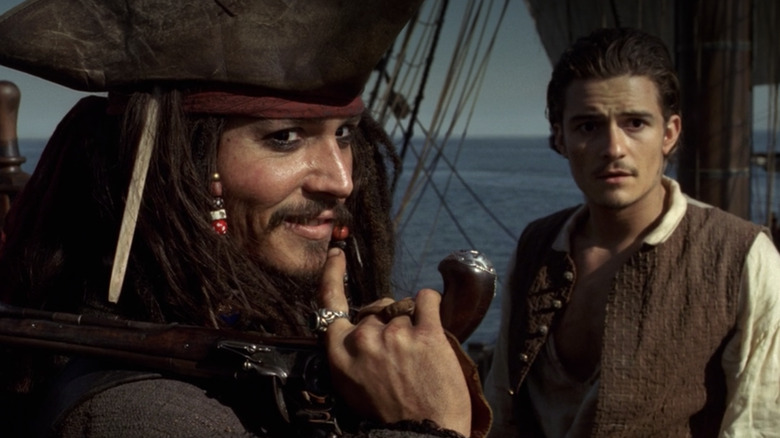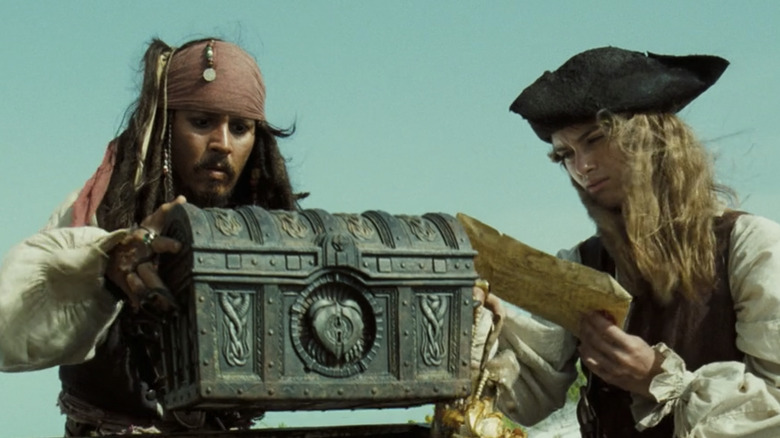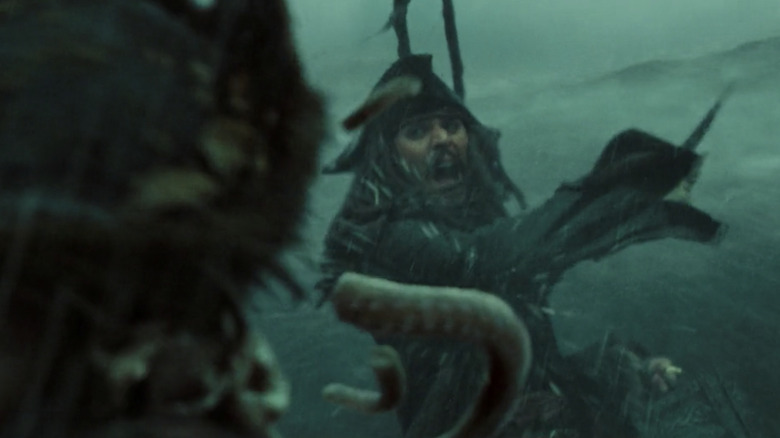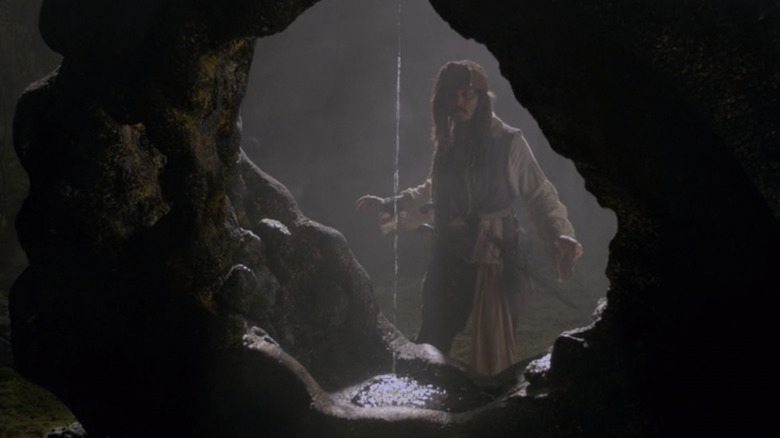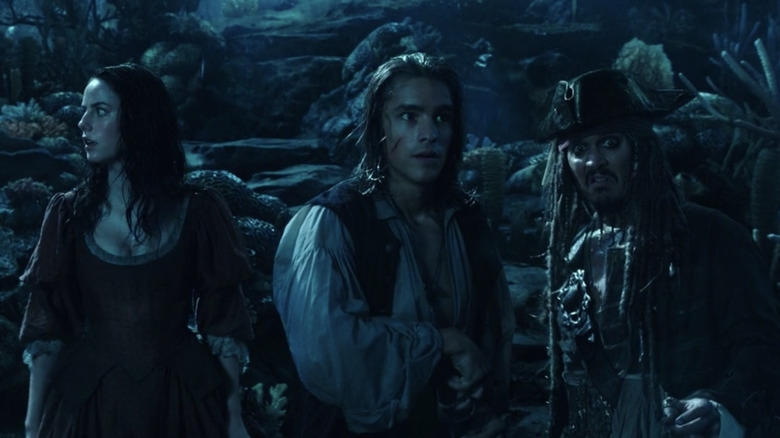This Is The Correct Order In Which To Watch The Pirates Of The Caribbean Movies
Who doesn't love swashbuckling adventures? The words hilarious, dangerous, and exciting all come to mind whenever one thinks of "Pirates of the Caribbean," and for good reason! Headlined by Johnny Depp, Orlando Bloom, and Keira Knightley, this theme park ride-turned live-action blockbuster was a trailblazer for Disney's live-action development and proved that the company could successfully handle more than just animated content. To be fair, an animated "Pirates" feature would've been pretty great, but there's something a lot more magical and tangible about these stories being told in a live-action format.
If you're looking to jump into the "Pirates of the Caribbean" franchise head-first, then it's important to make sure you're experiencing the story in the right way. Thankfully, this is a series that's pretty straightforward and should be consumed chronologically in order to get the full effect. Although we don't know what the future holds for the "Pirates" series, and it's likely that Johnny Depp won't ever return to the franchise, at least we can always hold onto what's come before and enjoy the seafaring adventures with Captain Jack and his pirate crew. That is unless Davy Jones catches up to us first...
Also, before you drop too far into the franchise you might also want to seek out the short film "Pirates of the Caribbean: Tales of the Code: Wedlocked." This story takes place immediately before the events of "The Curse of the Black Pearl," chronologically, we recommend you watch it right after you finish the first film.
Curse of the Black Pearl is the place to start
There's no better place to start than the beginning, and as far as "Pirates of the Caribbean" is concerned it's really the only place! The original 2003 film — which feels pretty stand-alone compared to many of its eventual sequels — introduces us to Johnny Depp's Captain Jack Sparrow as he fights to reclaim his rightful place as captain of the Black Pearl. Along the way, Jack meets Will Turner, the son of an old pirate named "Bootstrap" Bill Turner who had cursed Jack's former first mate Captain Barbossa after they mutinied against Jack for the Pearl. After Barbossa and his crew kidnap Elizabeth Swan, Jack and Will set sail to rescue her, and so that Jack can kill Barbossa and take back his ship.
The original film is a masterpiece and a swashbuckling adventure that's nearly unparalleled. "The Curse of the Black Pearl" is an adventure that mixes pirate legend and 1700s international politics with ghost stories and perfect comedic timing. Not only does the first "Pirates" film excel at introducing you to the world, but its character-driven focus lays the groundwork for the rest of the franchise and is the perfect launching point for Jack, Will, Elizabeth, and the rest of the often grime-covered crew. The rest of the films wouldn't really make as much sense without the first installment, which is why you can't sleep on this one.
Dead Man's Chest opens up the mythology
The 2006 "Pirates" sequel dives right into the action from the get-go, and doesn't leave us with much room to breathe until the credits roll — but that's exactly what these movies should be! "Dead Man's Chest" picks up not long after the events of the first film, with Will and Elizabeth set to be married only for the event to be interrupted by some new, well, complications. As Will attempts to use Jack to help win Elizabeth back from Lord Cutler Beckett, it's revealed that not only is Davy Jones real — and played to perfection by Bill Nighy — but he holds a contract with Jack that will cost him his life unless he can make a deal. Needless to say, Will gets into a pretty sticky situation here.
Unlike the first film, "Dead Man's Chest" throws us into the deep end of the overall "Pirates" mythology and expands on the world in a way that was unexpected at the time. Between the inclusion of Davy Jones and his Kraken, the threat of the East India Trading Company, and the increasingly complex dynamic between Jack, Will, and Elizabeth, there's a lot that the second film has to offer, especially since it does everything it can to set up the third film, which is the final installment in director Gore Verbinski's "Pirates" trilogy.
At World's End closes the chapter
The initial conclusion of the "Pirates of the Caribbean" trilogy, the third film — released in 2007 — takes us to the end of the world, and then right over it. As our heroes attempt to rescue Jack from Davy Jones' Locker, a war breaks out between the pirates and East India Trading Company, with Davy Jones himself trapped as Lord Beckett's own personal lapdog. "At World's End" is the culmination of the last two films, with satisfying character arcs, amazing battle sequences, and an immaculate score by Hans Zimmer that'll make you feel things you didn't think you would feel watching a Disney movie about pirates. Of all the "Pirates" movies, this one is the most intense.
Although the series continues on after this, "At World's End" marks the end of the initial "Pirates" story, with many of the main cast members moving on after they stop the world from, well, ending. Even Jack Sparrow learns a thing or two from his experiences here, giving up his own dreams and supposed destiny for the sake of something he could never have: true love. This swashbuckling epic goes above and beyond, and due to its massive success there was no doubt that Disney would continue the franchise beyond Gore Verbinski's initial vision for the series. Though Verbinski would also exit, the "Pirates" world would continue, and chart new waters beyond what the original films ever promised.
On Stranger Tides takes the series in a new direction
The fourth film wouldn't be released until four years after its predecessor's debut, and it would prove to be the most expensive movie ever made. If one could say anything about 2011's "On Stranger Tides," it's that it has some of the best production value in the entire series. As Jack Sparrow searches for the Fountain of Youth, he's reunited with shakey allies, old flames, and the fiercest pirate of them all: Ian McShane's Blackbeard — who serves as the antagonist. Although this film takes place in the fallout of the previous installment, it's a standalone story that — like the first film — attempts to re-introduce us to the entire series, albeit with Jack Sparrow in the leading role with no one to balance him out.
Taking place seventeen years after the third movie, this sea-faring fantasy takes Jack and the rest of the cast all across the Caribbean on an adventure to find immortality, a desire that still drives all of Jack's thoughts and intentions. Hoping to step away from the previously established mythology, "On Stranger Tides" does its best to make itself both unique and independent from the previous installments, and while it does so with relative success, the events of this film are hardly consequential to the rest of the series. That said, it's still a fun ride that's worth the watch, especially if you already love Captain Jack.
Dead Men Tell No Tales goes back to Jack Sparrow's roots
The final installment in the "Pirates" series, the fifth film takes place about five years after the fourth, though it takes more cues from the original Gore Verbinski film than any others. Introducing the young Henry Turner, son of Will and Elizabeth, and Carina Smyth, a young astronomer, "Dead Men Tell No Tales" sort of re-treads on the first movie, albeit with ghosts instead of zombies. Still, there's enough mythology in this movie — such as our heroes trying to break every curse in the sea — to keep fans of the other three films invested too, and the way that this movie ends leaves a lot of unanswered questions pretty open-ended, with lots more room for further stories set in the "Pirates" world.
Unfortunately, "Dead Men Tell No Tales" may be the last time we ever see Captain Jack Sparrow after Disney dropped Johnny Depp, but thankfully this film sees Captain Jack once again learn to live beyond his own selfish desires — which is on-brand given that he teams up with Will and Elizabeth's son. While not as satisfying a conclusion as "At World's End," the fifth "Pirates" movie is all we have — and it may be the last time we venture across the Caribbean seas for a long time. But, if you can say anything about this movie, it's that "Dead Men Tell No Tales" has the best title in the franchise by far.
